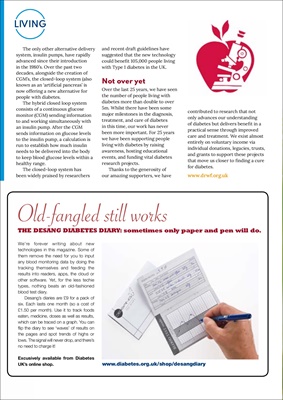
24
LIVING
GOING SOMEWHERE?
Old-fangled still works
We're forever writing about new
technologies in this magazine. Some of
them remove the need for you to input
any blood monitoring data by doing the
tracking themselves and feeding the
results into readers, apps, the cloud or
other software. Yet, for the less techie
types, nothing beats an old-fashioned
blood test diary.
Desang's diaries are £9 for a pack of
six. Each lasts one month (so a cost of
£1.50 per month). Use it to track foods
eaten, medicine, doses as well as results,
which can be traced on a graph. You can
flip the diary to see 'waves' of results on
the pages and spot trends of highs or
lows. The signal will never drop, and there's
no need to charge it!
Excusively available from Diabetes
UK's online shop.
THE DESANG DIABETES DIARY: sometimes only paper and pen will do.
www.diabetes.org.uk/shop/desangdiary
system, insulin pumps, have rapidly
advanced since their introduction
in the 1980's. Over the past two
decades, alongside the creation of
CGM's, the closed-loop system (also
known as an 'artificial pancreas' is
now offering a new alternative for
people with diabetes.
The hybrid closed loop system
consists of a continuous glucose
monitor (CGM) sending information
to and working simultaneously with
an insulin pump. After the CGM
sends information on glucose levels
to the insulin pump, a calculation is
run to establish how much insulin
needs to be delivered into the body
to keep blood glucose levels within a
healthy range.
The closed-loop system has
been widely praised by researchers
and recent draft guidelines have
suggested that the new technology
could benefit 105,000 people living
with Type 1 diabetes in the UK.
Not over yet
Over the last 25 years, we have seen
the number of people living with
diabetes more than double to over
5m. Whilst there have been some
major milestones in the diagnosis,
treatment, and care of diabetes in
this time, our work has never been
more important. For 25 years we
have been supporting people living
with diabetes by raising awareness,
hosting educational events, and
funding vital diabetes research
projects.
Thanks to the generosity of
our amazing supporters, we have
contributed to research that not
only advances our understanding
of diabetes but delivers benefit in a
practical sense through improved
care and treatment. We exist almost
entirely on voluntary income via
individual donations, legacies, trusts,
and grants to support these projects
that move us closer to finding a cure
for diabetes.
www.drwf.org.uk